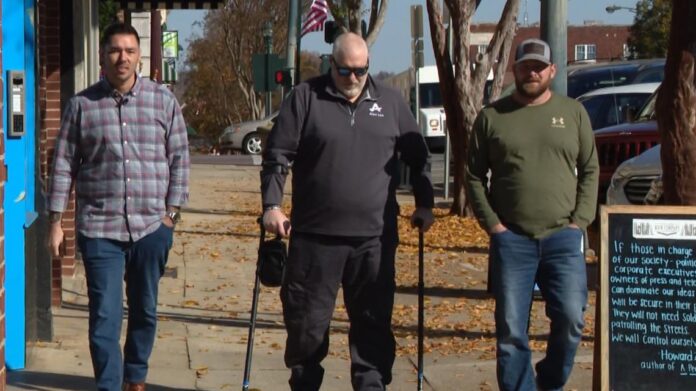There are 39 total family members consisting of three generations of confirmed cases of ALS.
CHARLOTTE, N.C. — Dozens of people in one North Carolina family all have amyotrophic lateral sclerosis, a deadly disease with no cure that is more commonly referred to as ALS or Lou Gehrig’s disease.
“I was diagnosed about a year ago,” Michael Jones, who is 46 years old, said.
His cousin, Scotty Easter, is 37.
“When I got diagnosed, it was almost a relief because I had an answer,” Easter recalled.
A third cousin, Cory Mosley is 38.
“I caught mine fairly early,” Mosley said. “Earlier than most folks in our family have caught theirs.”
Three cousins – all battling ALS – an incurable neurological disease that robs people of control of their muscles. The deadly disease has ravaged their family for three generations.
“Our great-grandfather had it. Then all but one of his children [had] confirmed ALS cases – and then at least one child of every one of those folks have had it,” Mosley explained. “And me and Scotty are the first grandkids diagnosed.”
There are 39 total family members consisting of three generations of confirmed cases of ALS.
For so many family members to suffer from ALS is rare. Only five-to-10% of people with ALS in the U.S. have a family member with the disease. The cousins said their family members with ALS all have the same gene – called SO D1. The gene is the second most common cause of genetic ALS worldwide.
“It sucks, my mom passed away of it when I was 12,” Jones recalled. “She had a twin sister. She passed away five years later. So in the back of my mind, we always knew it could happen.”
Jones is not alone. Mosley lost his mother eight years ago.
“It’s hard to watch,” Jones said. “Hard to see someone go through and knowing where it’s going to eventually.”
The toll is both physical and emotional.
“She was beautiful,” Easter remembered. “Just to see her go through that. Really seeing her shut herself in her house because she wanted people to keep that [previous] image of her.”
“I have a daughter about to turn eight and that’s constantly on my mind,” he said. “Worrying about, ‘Did I pass this horrible gene to her,’ is tough.”
Mosley worries about the impact on his daughter.
“It makes you feel like you’re taking a little bit of her childhood away,” he explained. “That gets pretty tough.”
Mosley said his daughter understands that he is sick.
“She’s starting to help me, which is tough because you’re the father – I’m used to being the person that goes and does and helps other people,” he shared. “It’s harder to do that stuff.”
Easter has four kids. The youngest is just four years old.
“My 17- and 14-year-old, they help me a lot,” he said. “It’s probably been one of the hardest things to live with: accepting people’s help.”
Jones agrees, getting emotional when he talks about needing so much help from his wife.
“Doing simple stuff has gotten a little difficult,” Jones said. “I rely on my wife a lot. It’s a little difficult.”
All three say they’re sharing their story because they want to spread awareness and hope that someday there will be a cure.
For families concerned about genetic ALS, doctors recommend waiting to test children until at least 18 years old.
In the summer of 2014, the ALS Ice Bucket Challenge inspired over 17 million people around the world to dump ice water on their heads and donate to an ALS organization. The Challenge raised $115 million to support ALS research and care for people living with the disease. If you would like to donate to ALS research, you can support the ALS Association.
Contact Michelle Boudin at mboudin@wcnc.com and follow her on Facebook, X and Instagram.
